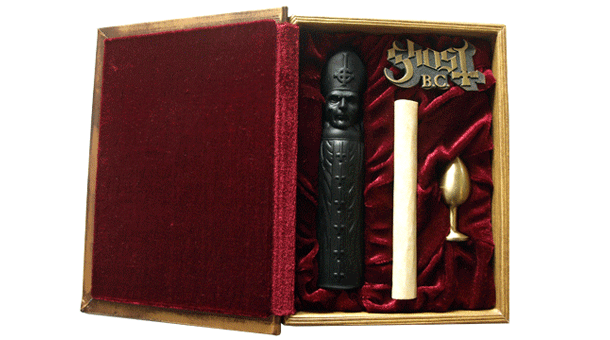On Tribulation’s third album, The Children of the Night, the Swedish quartet follows metal’s obsession with horror much further than their peers. On their past albums, 2009’s Swedish death explosion The Horror, followed by horse-sized hallucinogen The Formulas of Death in 2013, Tribulation showed they were onto a form of death metal as exciting as it was confounding, frustrating in its excesses and the deluge of ideas. It was death metal, but pompous and grotesque and retroactive, like a perverse stage full of elaborate, hallucinogenic satanic rites; in short, captivating. On the current release, Tribulation succeed with an album that strips away much of the previous ostentation. By melding the regal horror of Noferatu with twin guitars from the coveted early 1980s, Tribulations use haunting elements from the past to create a sound that creeps, crawls, and will cast a tall, dark shadow into the future.
The Children of the Night is an album of big riffs, arena-sized in their delayed clarity and echo, and aching to be timeless as the undead. These songs are eerily, otherworldly, hauntingly familiar yet original. They inhabit familiar stark tableaus of horror, antiquated, finally resurrected from some dusky vinyl bin. This is the Addams Family jamming on Dissection outtakes, bashing and banging out hopelessly great songs about devilish spirits and forsaken vampires. Asides from Johannes Andersson’s rasping, reaping vocals, these songs are barely-black metal, hardly death metal, too malevolent for rock, more akin to Mercyful Fate at their stomping best. There’s little in the way of blast beats or tremolo, but there’s a pervasive tone of gleeful dread, like a waltz through the crypt. Partly why the tone is so effective is that Tribulation have reigned in some of their excesses. This album clocks in twenty minutes shorter than its predecessor, which means those winding guitar flights of fancy bite down hard and fast instead of meandering stoned.
Creepy organ swells induce that feeling of funeral parlours in the first song “Strange Gateways Beckon,” before those echoing, straining guitars you’ll want get to know begin winding up. The scene is set perfectly before the rest of the band comes rolling from the darkness under the bed. There’s an unusually light application of drums, lots of cymbals riding long, but the rhythms are actually playful. It all makes a perverse sense: horror and all its sultry evil is supposed to be fun, after all, and those old black and white Transylvanian images are given new life here.
It’s a quick run down the hallway of a haunted house for the next three songs, each with a way of working in almost immediately, the screw turning. Instrumental ”Sjalaflykt” works for the same reason the other songs work: easy riffing with building solos and memorable melodies, drums that flare up, and vocals that rip the darkness to shreds, all hung on a rusty hook. More goodness follows, and “Holy Libations” is goddam near perfect of an 80s arena rocker as I’ve ever heard. It has enough starts and stops and duelling solos to keep an army of hands throwing horns. It’s an awesome melody to come back to, and there’s just that bit of strings to add a touch of class to the proceedings. You hear them throughout the album, as well as little touches of organ or harpsichord, but here they help drag you down deep.
One reservation I have has to do with sequencing. Having “Cauda Pavonis” second to last seems an interruption, as it follows the retro muse to the full extent. It’s an ender, an outro, more befitting the movie’s credits than the prelude to the final action. It also effectively removes our four musicians, which is a shame because it leaves them with just “Music from the Other” to flash and wow for a finale after a piece of music that doesn’t quite match the procession. “Music from the Other” is as harsh as Tribulation get on the album, letting a pounding blacked beat lead to some scuzzy swirling riffing before swinging in with those soaring guitar leads that they always bring you back to. The echoing notes are disquieting this time, rather than comforting. It’s the harsh reminder of death at the end of all the nocturnal fun, supposedly immortal or not.
(Century Media)


